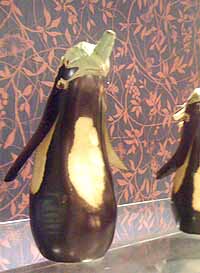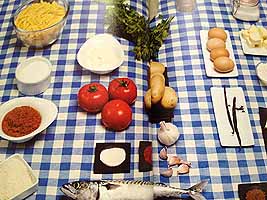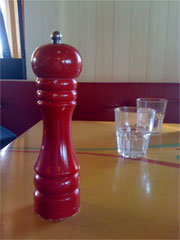By the Book
I sliced the eggplant into medium-thin slices, slimmer than the recipe suggested, but more to my bite-sized liking. De-facto would appreciate the efficiency of it; I’d only used one of the eggplants he brought home from the market. Not that our budget is so tight but rather he appreciates an intelligent economy of things.

The recipe called for baking the slices after they’d been breaded. After ten minutes in the oven they looked dull, melancholy. I quickly pulled out a frying pan and lined the bottom with olive oil. When it was hot, I dropped each of the austere eggplant slices in, smiling at the percussion of popping oil. I could sense the vegetable’s heavy sigh of relief, almost stunned at how close it had come to giving up its life to be a flavorless, mediocre meal. The infusion of fats would satisfy its desire to come to a tasty end, and frying made the house smell heartier. Now I was cooking.
Lately, though, I haven’t. The string of extended voyages placed De-facto as the primary care-giver for long stretches of time last fall and winter, and even though I always returned ready to roll up my sleeves, somehow the wooden spoon had been handed off like a relay baton. He’d gotten used to cooking dinner. In the absence of me taking the reins – or one of the reins as we’ve always shared this household task – he kept hold of them. Six o’clock would roll around and I’d ask not, “what do you want for dinner?” but instead, “what do you want to do for dinner?” A distinctly different question. If he’d answered with, “what I want to do is for you to cook,” I’d have complied without complaint. But since he seemed to be on a streak in the kitchen, I didn’t mind one less responsibility.
Except I missed cooking. He’d be at the stove braising a whole chicken before stuffing it and besieging it with potatoes and onions and vegetables. Short-pants would be standing on a small stool on the other side of the kitchen island, slicing mushrooms. I’d want to elbow my way back into that world of salt and butter and herbs, to cover my hands with flour and wince at the just-chopped onions on the cutting board. I didn’t complain, it’s a lovely thing to be cooked for and De-facto’s food fills the belly well. But I missed conjuring up my own culinary creative juices.

Reading Blood, Bones & Butter, by Gabrielle Hamilton, is what stirred the pot. My friend the Pastry Ace, who also happens to be a pâtissière and chocolatier – I’m sure she could cook anything but those are her current specialties – loaned me the book last fall. As a chef, she loved the story of this woman’s kitchen history, and the detailed tales of meals well conceived and prepared on the route to opening the restaurant Prune in New York city. As an avid reader, she loved the wordsmithing and thought that I might appreciate the writing, too. Having now finished the book I can attest – it’s a delicious read.
It took me months to get into it, though. Not that the first words and chapters aren’t appetizing. But I think many mothers might appreciate this syndrome: little or no time to read for pleasure during the day when the brain is actually alert. Once the kids are in bed and the dishes are done, the laundry folded, and I’ve slipped between the taut white sheets of my bed, it’s pure pleasure to switch on that reading light and open one of the books on the pile. But not even two pages later, my eyes droop and I’m startled awake as the book falls open on my chest. I’m always disappointed not to be able to read further, but the intoxicating serenity of sleep descending makes me smile with my eyes half open as I lean over to shut off the light.
It means I’ll go months before finishing a book, although at any given time I’m in the middle of five or six. And when weekends are too busy, the books gather dust. Until this weekend; I sat in bed for hours devouring the pages of Hamilton’s memoir. Short-pants, who’s reading the junior version of Three Cups of Tea for the tenth time – she’s an avid re-reader – climbed in next to me and we turned pages in tandem, wordless side-by-side as we consumed voraciously the words of our novels.
There are several passages in Blood, Bones & Butter that made me close the cover and hold the book close to my heart, like I had to savor it before I could read on. I’d open the book again, re-reading the paragraphs, admiring the combination of words that blended together, comma after comma, phrases pieced together to convey what happened to her and how she felt about it in perfect measure.

My sister gave me a cookbook for Christmas,
The Family Meal by Ferran Adrià, celebrated chef of El Bulli. I’d thumbed through its pages, treasuring the images of the ingredients, and the pragmatic rationale behind each menu. But it went on the shelf, with the other volumes of recipes, because as I said, I haven’t been cooking. That is until I was in the heat of Blood, Bones & Butter, when I pulled that new cookbook off the shelf, determined to use it. “I’ll make dinner tonight,” I told De-facto, stretching open the binding of the unexplored book. I flipped through its pages, again admiring the artistry of these simple meals – or so they were designated: the menus weren’t for Adrià’s Michelin-starred cuisine, but for the meals served to the restaurant staff prior to the dinner service.
And here it happened, what always happens. Inspired by a cookbook dish – in this case a menu – I realize too late that my kitchen is not properly stocked to prepare the recipe. I lack too many key ingredients even to fudge it. Cooking at this caliber requires advance planning, and my spontaneous return to the fold of kitchen service hadn’t include such a plan.
The most creative cooking is probably conceived when we must work with the limitation of what’s left in the pantry. The box of more-than-a-year-old lasagna noodles deserved some attention. There were two eggplants and just enough tomatoes to make a sauce. I called De-facto, who’d run out to do an errand, pleading with him to pick up some mozzarella and parmesan. I turned the oven on and pulled out that wrinkled apron.
The systematic chopping and dicing, the attention needed to carmelize something perfectly, the on-the-spot decisions to follow a recipe or improvise, it’s like an active meditation. Even when things go wrong and the pan is too hot or the croutons don’t transform into breadcrumbs as easily as you’d hoped, the problem solving required forces a mood of concentration and creativity that can be terribly satisfying. It’s nourishing for the soul.

At the table De-facto raved about the aroma and celebrated the novelty of something different to eat. The girls weren’t as inspired. Buddy-roo pushed the large noodle around her plate, eating the steamed broccoli that accompanied it, but laying her fork down on the rest.
“It’s just a big pasta,” said De-facto, “you love pasta.” She scrunched up her nose at the eggplant. It made me think of something my father used to say, when I refused his favorite delicacies, Welsh rarebit and pig’s feet. “You don’t know what’s good,” he’d say.
My lasagna wasn’t by the book, but it was good. It was a tasty change of pace from our habitual menus. It was good to be in the kitchen again. It was also good to finish a good book and return it to a good friend. Now if I could just open that new cookbook again, before I make the next shopping list, maybe there are a few good meals ahead.


April 2nd, 2012 at 5:52 am
A fun post about food and creativity and making a mess!
You may want to proof for spelling reins and taut…just in case there are any picky Brownies out there 🙂
April 2nd, 2012 at 7:51 am
Good catches. Glad they were in this post, and not the last one…about spelling!
April 2nd, 2012 at 11:29 pm
oh no… no puedo ponerme a leer ahora todos los !tab! que abrí desde este post, porque tengo abiertos otros tab dónde estoy escribiendo cosas que tengo que entregar mañana… así que me dejo todo abierto para leer mañana. siempre me inspiras con nuevos blogs y libros… (la semana pasada finalmente leí el libro de Amy Chua, que tu habías citado en uno de tus posts) ¡besos!
April 3rd, 2012 at 2:51 am
So, since I am enamored with your craft of the written word…I ordered the book today. Only because I love to cook and because i love a perfectly crafted sentence….Thanks for always bringing me a smile.
April 3rd, 2012 at 8:47 am
When you get about 2/3 through the book, there’s a passage where she leads up to a discovery of the bait & switch. I had to read it three times, I loved it so much. For its writing, but also its placement in story. Hope you love it as I did.
April 3rd, 2012 at 7:04 am
“Blood, Bones, and Butter,” those are my kind of “Hunger Games.”
This, your last post about the bee, and the Valentines one, are three #success responses to your #fail from a few years back. I’m sure there are others, I just haven’t read them (still catching up).
So. Even if you still feel as if you’re rushing around and never have the time to do what you really want. You just did, again.
I’m proud of you. And happy to be inspired by you as well.
April 9th, 2012 at 9:46 pm
after my boss read that book, he said we had to eat there. at prune, that is. it was fabulous. i kept thinking how much my mother would have liked it. come to new york. you and i, we’ll go to prune.
also, i think you’d like An Everlasting Meal, by Tamar Adler.